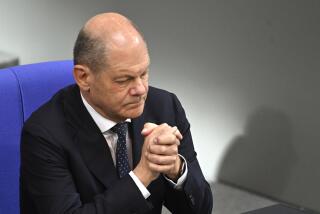Bonn Considers Curb on Welfare Benefits for Refugees : Europe: Despite reforms in the East Bloc, the exodus continues, upsetting many West Germans.
- Share via
BONN — In an effort to discourage the flood of East German refugees, the West German government set up a committee Tuesday to consider reducing welfare benefits extended to newcomers.
Spokesman Hans Klein told reporters after a meeting of the governing coalition that the committee will “deal with the consequences for social policy of the dramatic changes in East Germany.”
Last year, as pressure built for political and economic reform in East Germany, a record 344,000 East Germans made their way to West Germany, along with 377,000 ethnic Germans from elsewhere in East Europe. Hans-Dietrich Genscher, the West German foreign minister, said Tuesday in Bucharest that more than 100,000 ethnic Germans plan to emigrate to West Germany from Romania despite the fall of the dictatorship there.
Even though the Communist government has fallen in East Germany and reforms have been undertaken by the new government of Prime Minister Hans Modrow, the refugee flood has continued at the rate of 3,000 a day.
The West German constitution recognizes all Germans as citizens, and people from the East are automatically eligible in the West for full welfare benefits.
The arrival of so many refugees has upset many West Germans, who see the newcomers as competing for scarce jobs and housing while taking advantage of welfare benefits that in some cases exceed the benefits of people who have worked a lifetime for them.
The coalition government, which has seen its popularity rise since the Berlin Wall came down, fears a backlash among West German voters if large numbers of East Germans continue to settle in the west.
Chancellor Helmut Kohl, who advocates some form of German reunification, would like to see the East Germans stay home, because a heavy influx might damage his party’s chances in the general elections scheduled for December.
Also, the departure of so many people, most of them young, is damaging the East German economy, and West German taxpayers fear that in the end it is they who will have to make good the losses.
Labor Minister Norbert Bluem, who heads the Cabinet committee set up Tuesday, is described as an advocate of denying to East Germans any benefits exceeding those available to West Germans.
In addition, he is reported to be worried that among the newcomers are former members of the East German security police, the Stasi, who would also be eligible for such benefits.
Refugees get the same pension and health benefits as West Germans, plus help in finding housing.
Wolfgang Boetsch, parliamentary leader of the Christian Social Union, said the Bonn government should no longer be obliged to help East Germans find housing on this side of the border.
“Anyone who has to spend three years living in a sports hall will think carefully before moving here,” he said, referring to the recreation centers where many refugees have been housed.
Otto Lambsdorff, leader of the Free Democrats, said that he too thinks the government should review its program of benefits for refugees.
Nonetheless, East German Protestant Bishop Christoph Demke said he thinks the emigration will continue. Referring to the elections scheduled for May 6 in East Germany, Demke said: “If the opposition loses, its voters will go; if the Communist Party loses, its people will go.”
Meanwhile, Christa Luft, the East German minister of economics, indicated that her government might allow some West German firms to have a controlling interest in East German companies.
Laws enacted since the fall of the Communists permit foreign investment in some firms but restricts it to minority holdings of no more than 49%. A recent poll of West German businessmen found that few would invest unless they could have a controlling interest.
“Exemptions to the rule are possible,” Luft, who was visiting Bonn, said Tuesday.
Although she seemed to be encouraging foreign investment, other East German leaders have indicated that they want Western aid to support, but not alter, the state-run economy.
More to Read
Sign up for Essential California
The most important California stories and recommendations in your inbox every morning.
You may occasionally receive promotional content from the Los Angeles Times.













